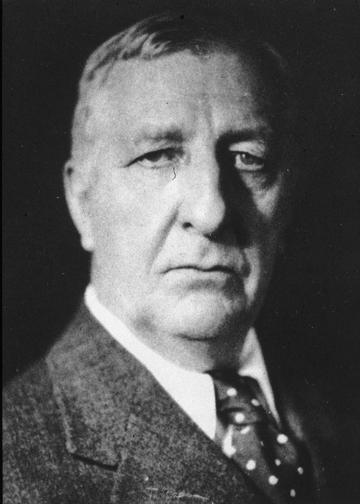- William McDougall (psychologist)
Infobox Scientist
name = William McDougall
box_width =
image_width =180px
caption = William McDougall
birth_date =June 22 ,1871
birth_place =Chadderton ,Lancashire ,England
death_date =November 28 ,1938
death_place = Durham, N.C., U.S.
residence =
citizenship =
nationality =England
ethnicity =
field = psychologist
work_institutions =
alma_mater =
doctoral_advisor =
doctoral_students =
known_for =
author_abbrev_bot =
author_abbrev_zoo =
influences =
influenced =
prizes =
religion =
footnotes =
William McDougall (June 22 ,1871 inChadderton ,Lancashire ,England -November 28 ,1938 Durham , U.S.) was an early twentieth century psychologist who spent the first part of his career in the UK and the latter part in theUnited States . He wrote a number of highly influential textbooks, and was particularly important in the development of the theory ofinstinct and ofsocial psychology in the English-speaking world. He was an opponent ofbehaviorism and stands somewhat outside the mainstream of the development of Anglo-American psychological thought in the first half of the twentieth century; but his work was very well known and respected among lay people.McDougall studied medicine and physiology at the
University of Cambridge and inLondon , and Göttingen. After teaching atUniversity College London and Oxford, he was recruited byWilliam James toHarvard University , where he served as a professor of psychology from 1920 to 1927. He then moved toDuke University where he remained until his death. He was a Fellow of theRoyal Society . Among his students wasCyril Burt .McDougall's interests and sympathies were broad. He was interested in
eugenics , but departed from Darwinian orthodoxy in maintaining the possibility of the inheritance of acquired characteristics, as suggested byJean-Baptiste Lamarck ; he carried out many experiments designed to demonstrate this process. Opposing behaviourism, he argued that behaviour was generally goal-oriented and purposive, an approach he called hormic psychology; however, in the theory ofmotivation , he defended the idea that individuals are motivated by a significant number of inherited instincts, whose action they may not consciously understand, so they might not always understand their own goals. His ideas on instinct strongly influencedKonrad Lorenz , though Lorenz did not always acknowledge this. McDougall underwentpsychoanalysis withC. G. Jung , and was also prepared to studyparapsychology ; in 1920 he served as president of theSociety for Psychical Research , and in the subsequent year of its US counterpart, theAmerican Society for Psychical Research [Citation
id =PMID :11610086
url= http://www.ncbi.nlm.nih.gov/pubmed/11610086
last=Krantz
first=D L
last2=Hall
first2=R
last3=Allen
first3=D
publication-date=1969 Jan
year=1969
title=William McDougall and the problem of purpose.
volume=5
issue=1
periodical=Journal of the history of the behavioral sciences
pages=25-38] .Because of his interest in eugenics and his unorthodox stance on
evolution , McDougall has been adopted as an iconic figure by proponents of a strong influence of inherited traits on behaviour, some of whom are regarded by most mainstream psychologists as scientific racists. While McDougall was certainly an unorthodox figure and always willing to take a minority view, there is no reason to suppose that in the light of modern psychological knowledge and political developments, he would have supported the position taken by these groups. Though he wrote: "...; the few distinguished Negroes, so called, of America - such as Douglass, Booker Washington, Du Bois - have been, I believe, in all cases mulattoes or had some proportion of white blood. We may fairly ascribe the incapacity of the Negro race to form a nation to the lack of men endowed with the qualities of great leaders, even more than to the lower level of average capacity" (McDougall, William., The Group Mind, p.187, Arno Press, 1973; Copyright, 1920 by G.P. Putnam's Sons).McDougall married at the age of 29 ("against my considered principles", he reports in his autobiographical essay, "for I held that a man whose chosen business in life was to develop to the utmost his intellectual powers should not marry before forty, if at all"). He had five children.
'....I am one of those who cannot find reason to believe in the existence of panaceas, elixirs of life, and philosopher's stones, one of those who believe rather that the price of liberty and human dignity is unceasing vigilance and perpetual struggle with the infirmities of our own nature. ....surely, if we would form some useful notion of what human beings may and should become under intensive cultivation, and, still more, if we would know how to conduct the process of cultivation so as to make some progress toward that ideal, we must start with some notion of the raw material provided by Nature for us to work upon! ....If I have a religion, its first precept is that we shall seek truth faithfully; and I would say this with Emerson: "God offers to every mind its choice between truth and repose. Take which you please. You can never have both."' William McDougall, 1927, Character and the Conduct of Life. London : Methuen.
elected bibliography
*An Introduction to Social Psychology (1908–50, reprinted 1973)
*The Group Mind (1920, reprinted 1973)
*Physiological Psychology (1920).
*Outline of Psychology (1923)
*Body and Mind
*Outline of Abnormal PsychologyReferences
See also
*
Crowd psychology
*Social psychology External links
* [http://www.webcitation.org/5Y7KtO9iC Autobiographical essay written in 1930] .In Carl Murchison (ed.) "A History of Psychology in Autobiography". Vol. 1. New York: Russell and Russell (1930): 191- 223. Accessed 2008-05-26.
* [http://www.webcitation.org/5Y7KGy6C2 Chris Brand (1997). "William McDougall (1871-1938): heterodox and angry with psychologists by nature, nurture and circumstance"] . An essay presenting McDougall's intellectual concerns, positions and achievements. Accessed 2008-05-26.
Wikimedia Foundation. 2010.
